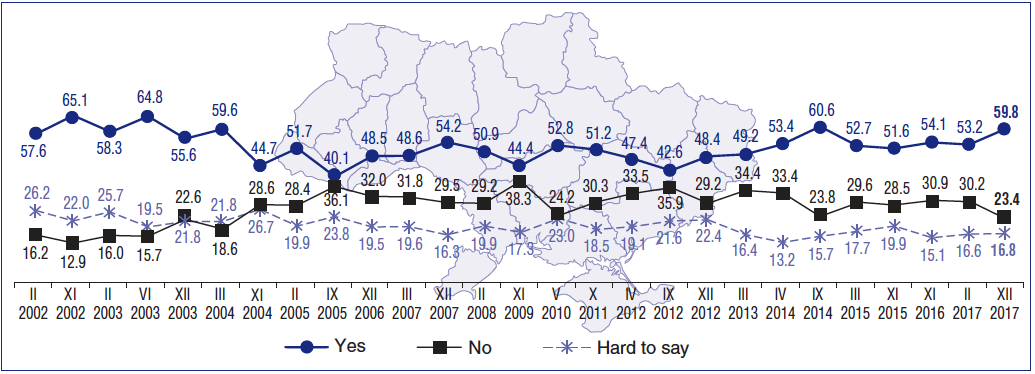Yuriy Yakymenko & Mykhailo Pashkov
Abstract
European integration in Ukraine is a complex, gradual process that touches upon different sectors — political, economic, social, cultural. But the psychological factor, represented in the conscious European choice of citizens and their support for the country's movement towards the EU, is even more important. This brief outlines the dynamics of Ukrainian citizens' attitude towards the EU and specific aspects of European self-identification processes among Ukrainians.
Introduction
After having gained its independence, Ukraine gradually determined its main development direction towards integration into the European community. The idea of European integration is a conscious and strategic choice of the Ukrainian society confirmed through many trials. The EU-Ukraine Association Agreement, which came into force in 2017, became the roadmap for domestic reforms. Ukraine is moving towards the EU, though not as fast as we would like it to. On the one hand, numerous internal problems slow down pro-European reforms. The Russian factor also represents a dangerous influence. On the other hand, the EU itself is currently undergoing complex transformations and searching for a new development model.
The brief uses results of sociological studies conducted by the Razumkov Centre in recent years, starting from 2002. The latest study was conducted by the sociological service of the Razumkov Centre together with the Ilko Kucheriv Democratic Initiatives Foundation from 15 to 19 December 2017 in all regions of Ukraine, except Crimea and the occupied territories of Donetsk and Luhansk oblasts. Number of respondents — 2004, age — from 18 y.o. Theoretical error of the sample does not exceed 2.3%.
Evolution of the Pro-European Sentiment in the Ukrainian Society
The formation of the geopolitical orientations of Ukrainian citizens is largely defined by the fact that the country found itself in the midst of two diverging directions of integration — the European and the Eurasian one, with fundamentally different goals, conditions and character.
People were influenced by Soviet-inherited inertia, complex socio-political processes inside the country, as well as powerful external influences. Under these circumstances, support for European integration was gradually formed and strengthened in Ukrainian society.
It is noteworthy that starting from 2002 (the year when the Razumkov Centre first commenced its sociological studies), the number of EU supporters has continuously outnumbered its opponents. Russia's aggression against Ukraine, which started in February 2014, drastically changed the balance of social sentiment.
First, the attitude of Ukrainian citizens towards Russia has profoundly changed, reflected by the fact that most respondents highlight the need to abandon or curtail contacts with Russia.
Second, the attitude of Ukrainian citizens towards the two different directions of integration — European or Eurasian — was influenced by the Revolution of Dignity in December 2013 — January 2014, which defended and affirmed the European course of Ukraine's development, as well as Russia's aggression (which essentially removed Eurasian integration from Ukraine's agenda).
While in the pre-war years (2011–2013) the share of Eurasian integration supporters was about a third of respondents, in the following years the number of Eurasian Economic Union proponents dropped to 15.9% in 2015, and to 7.8% in 2017. Accordingly, the share of European integration supporters increased.
Third, since 2014, we have observed a trend of growing positive attitude towards Europe in the Ukrainian society. In December 2017, already almost 60% of Ukrainian citizens supported Ukraine's accession to the EU.
Talking about the current level and nature of pro-European sentiment in the Ukrainian society, we must comment on the qualitatively new character of its motivation. On the one hand, people have a more realistic perception of the complexity and duration of the process towards EU integration. On the other hand, it is clear that choosing the European path is a natural choice for Ukraine, as a way to preserve its national statehood in opposing Russia's aggressive influence.
EU through the Eyes of Ukrainians: Assessments and Expectations
According to the results of a study conducted in December 2017, Ukrainian citizens have an overall positive attitude of the EU. The appealing image of the European Union consists of a number of achievements and advantages.
The most important achievement of the EU mentioned by Ukrainians is the high level of social security (46.4%). Other important advantages linked to the EU include the rule of law (27.8%) and democratic development (21.7%). Also mentioned as positive aspects are the low level of corruption (22.4%), the quality of healthcare (22.2%), the availability of financial resources (17.1%) and scientific and technological progress (14.6%).
Citizens mostly expect achievements brought about by European integration to be in social areas: improved living standards and income growth (45.8%), reduced unemployment and new jobs being created (31.5%), modern technologies and enterprise modernisation (29%).
Such expectations are quite logical in view of the abovementioned assessments of EU's advantages in the social sector. At the same time, respondents believe that positive outcomes of European integration will also include, among others, intensified anti-corruption activity (24.3%), strengthening the rule of law (16.9%).
Will Ukraine benefit or lose from joining the EU? Most respondents (54,9%) think that the country will benefit from joining the European Union. At the same time, about a quarter (22.5%) of Ukrainian citizens are pessimistic and are expecting the country to lose from EU membership. Note that compared to a previous study (from April 2013), the share of optimistically-minded citizens has visibly increased (almost by 10%)
Similarly, positive dynamics are also observed in assessments of personal benefits or losses from joining the EU. In December 2017, compared to April 2013, the percentage of optimistic respondents grew (from 41.2% to 48.2%) while the group of those convinced of personal loss has grown smaller (from 25.6% to 20.3%).
European Path: Problems of European Self-Identification
Ukrainian citizens' self-identification as Europeans and as part of a common European culture and history is lengthy and complicated process for several reasons. Elements that influence this self-identification are: the detachment from Europe's political and cultural life; the influence of former Soviet heritage; Russia's powerful anti-European information campaign, which relays the "Russian World" ideology, or the vague prospects of Ukraine's joining the EU.
However, percentage of citizens, who to a certain degree felt like Europeans grew in 2017 when compared to 2009 — from 31.4% to 40.3%. At the same time, the percentage of respondents who did not associate themselves with Europe decreased from 63.4% to 50.4%. This dynamic looks rather optimistic against the timeline of general European identity formation inside the EU.
It is noteworthy that starting from 2002 (the year when the Razumkov Centre first commenced its sociological studies), the number of EU supporters has continuously outnumbered its opponents (see Figure 1).
On the other hand, Ukrainian citizens, being aware of the gap between Ukraine and the EU, rather sensibly and critically assess its level of "Europeanness" by different criteria. Thus, most respondents believe that Ukraine is a European state in the geographical (74.8%) and historical (51.5%) sense. At the same time, 35.7% are sure that Ukraine is a European country in the cultural sense as well. Respondents are most critical with their assessments of Ukraine's compliance with European standards in the political (only 18.4% respondents), social (14.7%) and economic (11.2%) sectors.
Such assessments are not a sign of disappointment in European integration, but rather a reason to intensify efforts aimed at internal transformations which are bringing the country closer to European socio-economic and political standards.
If in the Near Future There Was a Referendum…
The level of pro-European sentiment in the Ukrainian society is very well illustrated by the potential readiness of citizens to vote in a hypothetical referendum for Ukraine's accession to the EU. Thus, the study conducted in December 2017 showed that if a referendum on Ukraine joining the EU was to take place in the nearest future, 73.5% of citizens would vote. Out of this number, 76.5% would vote for accession, 19% — against it, and the rest would be undecided.
Conclusion
Obviously, Ukraine's accession to the EU is a matter of the future, which depends on many factors, including both efficiency of domestic reforms and transformations within the EU itself. In the short term, on its path towards European integration, Ukraine will face daily painstaking work in the frame of the Association Agreement implementation, which aims to bring the country closer to the EU. However, and most importantly, now there are grounds to claim that Ukraine has passed the stage of choosing between the European and Eurasian path of development.
References:
1. Razumkov Centre’s collective of authors (2015): “Prospects of Ukrainian-Russian Relations (Conceptual Approaches and Practical Steps)”, in National Security and Defence, vol. 8–9 (157–158), pp. 59–76,
2. Razumkov Centre’s collective of authors (2016): “Ukrainian Identity: Changes, Trends, Regional Aspects”, in National Security and Defence, vol. 3–4 (161–162),
3. Razumkov Centre’s collective of authors (2016): “Russia’s “Hybrid” War — Challenge and Threat for Europe”, in National Security and Defence, vol. 9–10 (167–168), pp. 45–53,

Figure 1: Percentage of answers to question “Should Ukraine join the EU?”





